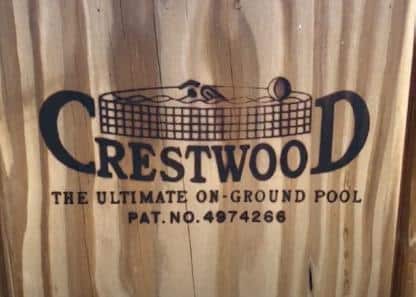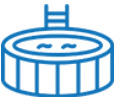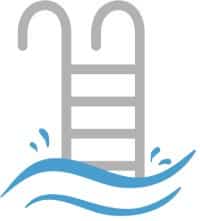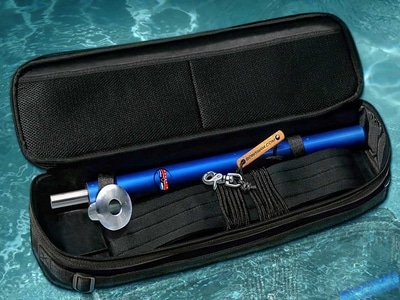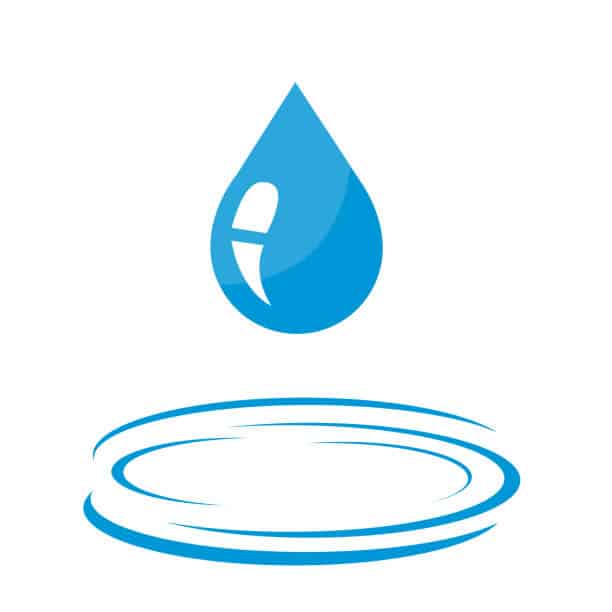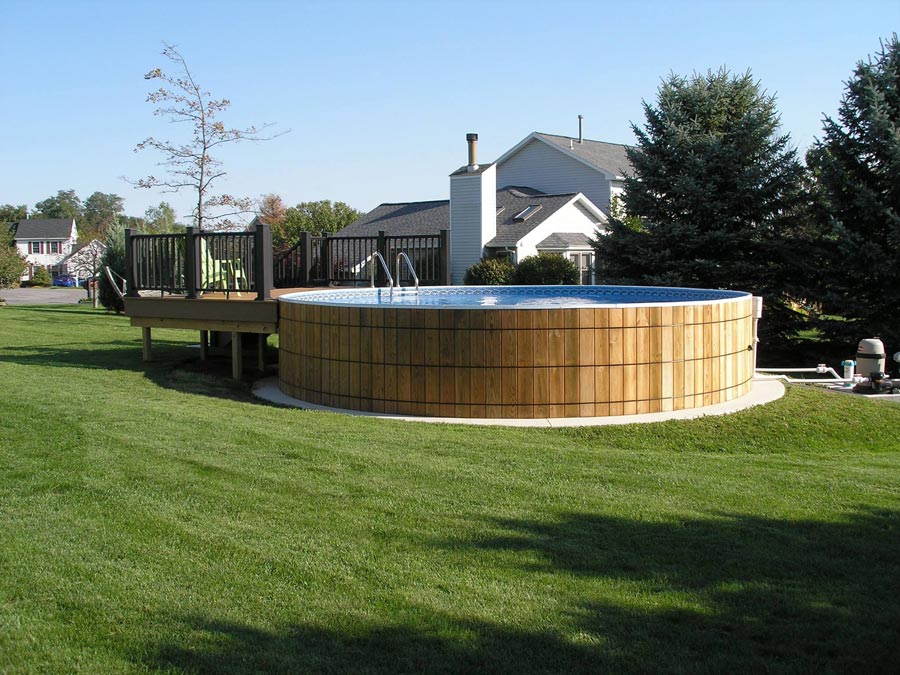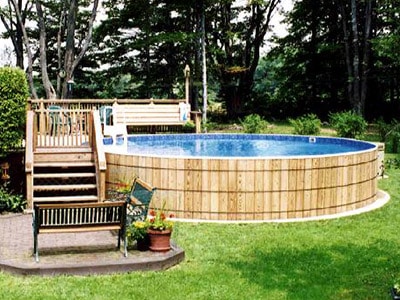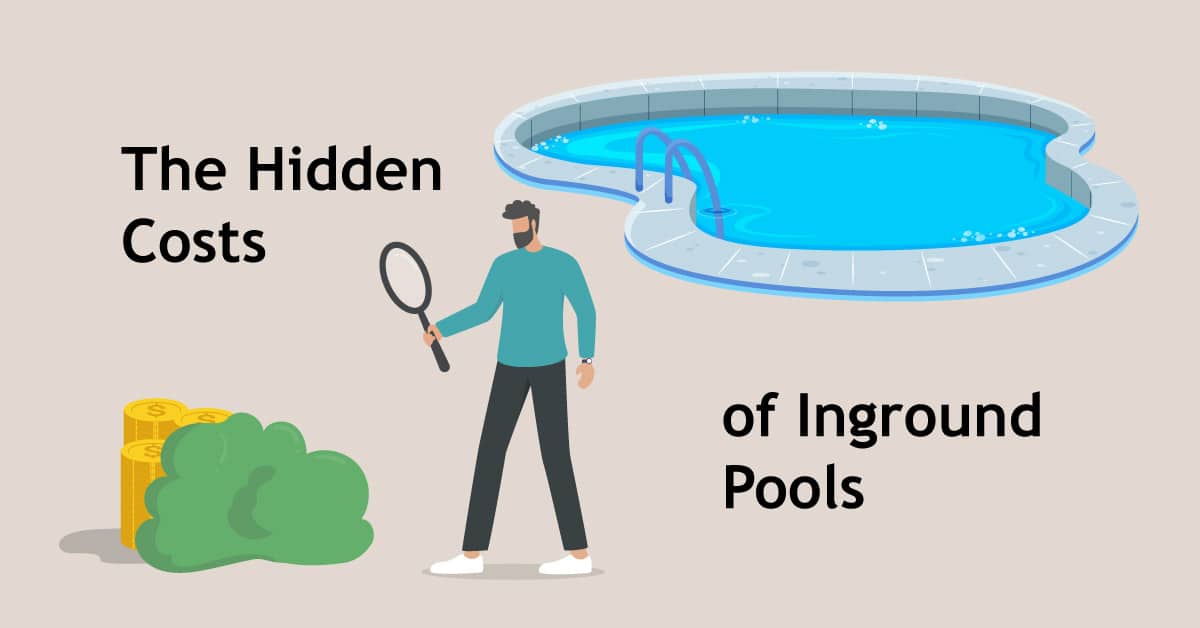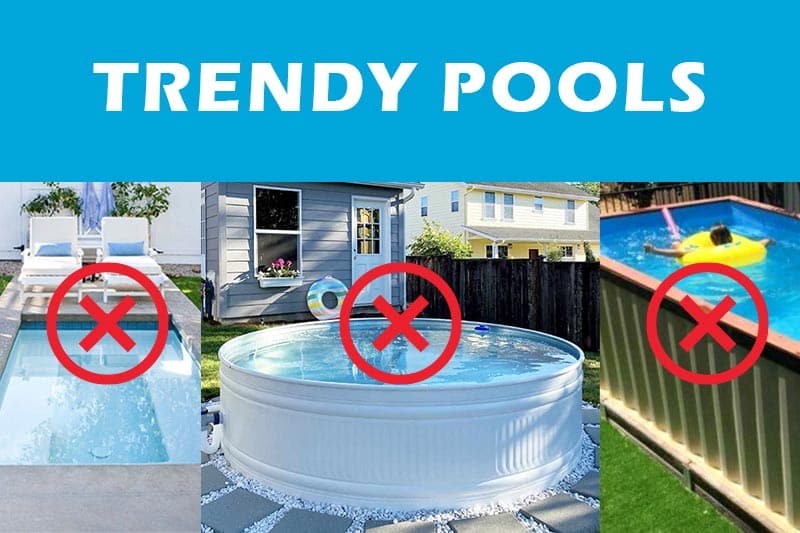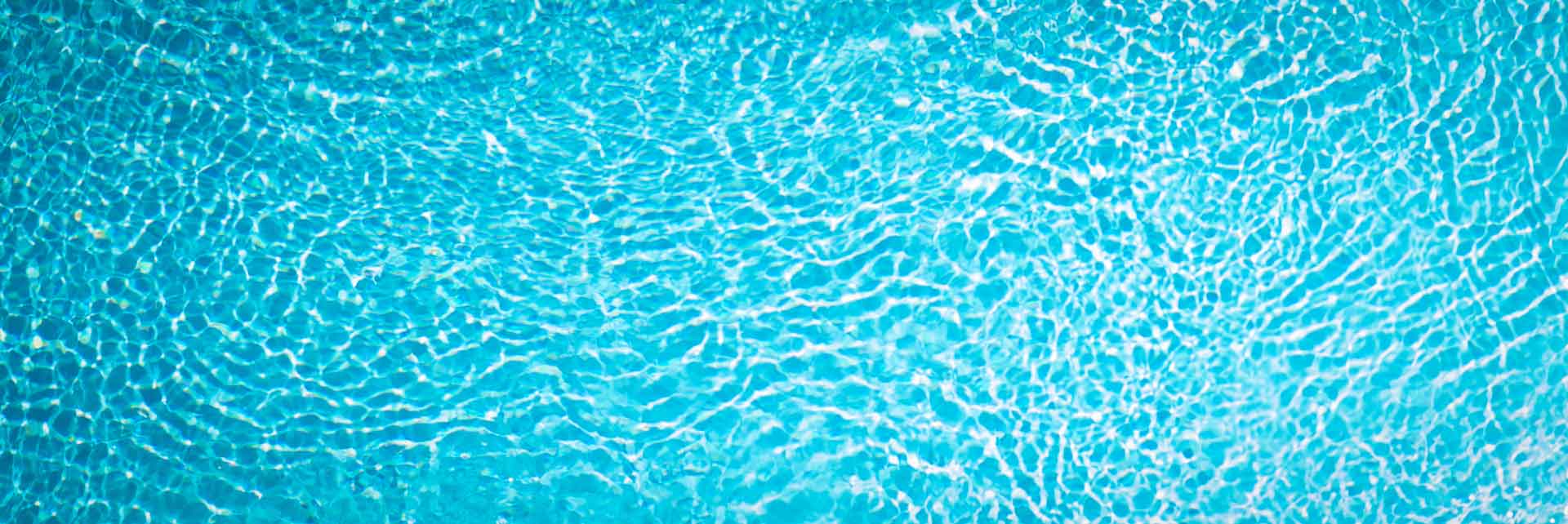What is your family known for? Whatever their forte, I’m confident they talk about it with passion, enthusiasm and wisdom. For over 50 years, my family has been living, breathing and singing swimming pools, gaining nationwide recognition for pioneering the wooden above ground swimming pool. In half a century, there is one question that is posed to us more than any other.
“What is the difference between inground, above ground, and onground swimming pools?”
You may be thinking that I always answer with a sales pitch for my family’s company, but that is never the case.
We’ve always built pools and served customers according to our highest standards, and yours.
Sometimes the right choice is an in-ground pool, and that’s okay. But I wrote this article specifically for you. Your property size, city and state regulations, and budget are just a few of the unique characteristics that will help you choose the right pool type for you and your family.
Not considering one of these 10 questions can have a negative impact on your budget and overall level of satisfaction with your swimming pool.
Please read the answers to the following 10 questions and fill out the form at the bottom of the page so that I know your questions have been answered. If you fill out the form, I will enter your name into our Crestwood Pools Spring Savings Contest.
10 Questions that will help you choose the right pool type
- Where do you live?
- Is your property on flat ground?
- How important are aesthetics to you?
- How important is safety to you?
- What does winter look like where you live?
- What’s your budget?
- How long do you think you’ll live at your current house?
- How would you describe your neighborhood—city, suburbs or rural?
- What does your dream pool look like?
- Do you currently have a pool?
1. Where do you live?
This is a very important question. The answer impacts pool budget, insurance, taxes, and how many add-ons you’ll need to purchase for compliance.
Factors that are progressively gaining traction these days are safety compliance, and water and energy efficiency. Depending on your state and locale, your pool type choice can impact whether or not the pool installation is a single contractor job that takes a few days, or a multiple contractor and inspector job that takes one to two months. I’ve seen some customers go over their budget by 10 to 25% because of the impact of where they live.
To help you understand how your locale can impact your pool budget before you buy, please take a look at this chart for your convenience. As a friendly disclaimer, this chart only answers a fraction of your question. I always recommend that you speak with a local pool contractor and/or someone at town/city hall about the added costs that may impact your pool budget. If you need help contacting a contractor, please let me know.
View State Pool Budget Impact Chart
2. Is your property on flat ground?
Our office is in the southern tier of New York State, which is very hilly with challenging backyard swimming pool installations—one of the contributing factors to our innovative onground pool design. Sloped yards can offer unique challenges and costs to each pool type, whereas flat yards offer challenges such as soil quality, and the presence of bedrock or underground water.
Let’s concentrate on the challenging landscapes. Inground pools require expensive retaining walls, significant ground preparation, and a combination of hardscaping and landscaping. Prospective above ground pool customers face the most complex challenges with sloped yards, leading them to change their minds more-often-than-not and choose an inground or onground pool.
Your yard may present challenges to pool installation and may also hide unforeseen future engineering work, so it’s important you share information about your property with pool retailers and installers.
3. How important are aesthetics to you?
I’ve never met someone who wanted an ugly pool, but I have met people that haven’t considered how their swimming pool visually complements their landscape and house.
Picture this… a beautiful inground pool basking in the summer sun one day, but a giant empty hole in the ground collecting leaves and dirt the next.
Picture this… a 30’ long above ground pool filled with laughter and play one day, but a gray galvanized steel structure that adjoins to a clay brick two story house the next.
Picture this… a beautiful onground pool constructed with pine wood and a dark brown finish that’s the envy of the neighborhood one day, but a clashing object sitting next to a pine wood deck with a light cedar finish the next.
Don’t ignore aesthetics. In addition to how your swimming pool complements your landscape and house, consider that you might need to add some of the following features based on pool type: pool fences are a common safety requirement; a concrete walkway; installation of plumbing and electrical piping; hardscaping and landscaping around your pool; pool liner color and design; LED lights; and more.
Similar to how I recommend that you speak with a Swimming Pool Installer before you choose your pool type, some pool installers are also landscaping businesses. Choosing a landscaper to install your pool will help you consolidate the number of contractors required to do the job, especially in states with high compliance standards.
4. How important is safety to you?
Consider this… Nearly 300 children under the age of 5 drown in home swimming pools every year in the United States [1].
Not included in that number is the 1 child every 5 days who drowns in a portable/inflatable pool, a pool type that is commonly not regulated and/or able to accommodate pool safety products like a fence or alarm [2].
Now think compliance and peace-of-mind. The latter is more important to you, but the former will cost you money in additional options and inspections depending on where you live and what pool type you choose. We understand that it’s extremely difficult to keep your eyes on the pool at all times, which is why some states and local jurisdictions are making public and private swimming pool safety a top priority year-after-year, so you’ll want to make sure to speak with your local pool installer and city/town hall for your best path forward.
Here are 2 things to consider.One, if you want to permit safe diving in your swimming pool, you’ll have to invest in an inground pool or onground pool with a deep end of 8 to preferably 10 feet. If you don’t want to permit diving, you’re better off going with an above ground or onground pool. Both pool types promote a “feet first” entry method for the youthful swimmers who’d rather jump into the pool than climb or walk into the pool.Two, you’ll want to speak with your home insurance agent. It’s growing more common that pool owners choose to increase their coverage because of a swimming pool’s ability to increase liability risk.
5. What does winter look like where you live?
As you may recall, we’re headquartered in New York State, so we get our fair share of negative wind-chills and blizzards, limiting our swimming days to around 90 each year. In addition to your locale’s annual swimming days, you’ll want to consider your soil temperature, what each pool type is made of, and how your pool will sustain itself in the offseason before you choose your pool type.
Soil temperature comes into play when considering an inground pool. If you’re looking to maximize swimming days in a northern state with short to medium swimming seasons, you might want to avoid inground pools because the soil can cool the water, similar to how the soil cools your home’s basement, thereby increasing the need for a pool heater and higher energy bills. When it comes to a pool’s materials, above ground pools can often be made of metal, which if not protected and exposed to your environment’s elements, can be weathered by corrosion or other forms of deterioration (which may or may not be covered by a warranty). Lastly, above ground and some onground pools can also require water year-round, unlike inground pools that are drained (ask me why our Crestwood onground pools don’t require water year-round). This can require a great-deal of reinforcing in the offseason because of the tremendous water load and freezing conditions, a contributing inspiration to the original creators of the onground pool type.
As I’ve shared before, it’s always safe to speak with a local installer that will have a better knowledge of your environment’s seasonal impact on each pool type. To help you understand how your locale can impact your swimming season, please take a look at the following chart for your convenience. As a friendly disclaimer, this chart only answers a fraction of your question.
View State Swimming Season Chart
6. What's your budget?
Similar to the purchase of a car, the sticker price hardly ever matches how much you pay at the end of the day, not to mention preventive maintenance and other costs after the purchase.
Before you read about each pool type’s impact on your budget, consider how this will impact the value of your home, which we’ll cover in our next question. If you’re debating between two pool types, and you want some honest, unbiased insight and feedback before you go any further, please add your question(s) to the form at the bottom of this page.
Inground Pools can range in price from $25,000 to over $100,000, but here are some points to consider. The aforementioned State Pool Budget Impact Chart shares Contractor Costs, and this budget impact applies to inground pools more than any other pool type combined. On top of that, if you’re also in a state with permit and safety complexities, you can anticipate several non-pool-construction contractors including plumbers, electricians and others, as well as inspectors, further increasing the total cost of your inground pool. Add mandatory safety products and a boost to your property taxes, and the inground pool type is by far the most expensive, at least 5 times the price of an above ground pool and 2 to 3 times the price of an onground pool.
Above Ground Pools can range in price from $200 to over $6,000, but here are some points to consider. If aesthetics is important to you, you’re going to want to invest in a deck kit, as well as landscaping around your pool to help disguise a possible retaining wall and other hardware. Although above ground pool manufacturers have made advances in sustainable materials and construction, this pool type will not outlast inground and onground pools, diminishing your return on investment.
Onground Pools can range in price from $3,000 to over $10,000, but here are some points to consider. Basic onground pools will bare a striking resemblance to above ground pools, but you can upgrade its aesthetics with a wooden construction inplace of a metal or other cheaper material construction. Wooden construction has slowly been increasing in popularity because of its adaptability to match existing decks or patios. Since onground pools are more adaptable to challenging terrains than above ground pools, you can expect similar contractor work as inground pools, but at a much lower level.
7. How long do you think you'll live at your current house?
I kept this separate from the question about budget because not everyone will consider selling their home in the near or distant future, but it’s an important question that warrants special attention because the average pool buyer will only see a 50% return on their investment at resale [3].
Referring back to the State Season Swimming Chart. If you’re in a state where the swimming season is year-round or very long, a pool can be seen as a worthwhile investment as it’s more common than not to buy a home with a swimming pool for the hot summers. If you live in a northern state with a short swimming season, the presence of a pool can likely be detrimental to your home’s resale value because of the minimal use and possibly year-long maintenance.
Above ground and onground pools offer more resale flexibility than an inground because of the lower cost to move / tear down. Above ground pools will be torn down the majority of the time after resale, requiring removal, freight and possible landscaping. Onground pools and inground pools will be kept the majority of the time, but if they’re not wanted by a potential buyer, they’ll require some landscape amendments, especially the inground with the removal of significant amounts of concrete and the filling of a large hole in the ground.
Like my recommendations to speak with contractors and town/city hall, this is a good question for your local real estate agent, who will know better whether or not you can recoup some of your pool investment when you sell. Onground pools with matching decks/patios and inground pools with exotic hardscaping have the most success with recouping a significant investment, whereas above ground pools hardly ever help people sell their house.
8. How would you describe your neighborhood—city, suburbs or rural?
We already spoke about pool installation in challenging landscapes, and local and state specific inspections and regulations as it pertains to safety, but there are some elements about your neighborhood that you should consider before choosing a pool type.
Urban and suburban environments have two elements that you need to consider: tight spaces and a whole lot of young faces. Homes are being built on increasingly smaller properties these days, and installing inground pools that require excavation machinery and cement can pose some tough challenges and extend the timeline significantly. Though inground has often been the most popular choice for urban and suburban neighborhoods, above ground and onground are growing in popularity due to their do-it-yourself installation options that do not require machinery, and city-specific avoidance of certain tax and safety laws. When it comes to neighbors, pools can often attract people and community events, but it can also attract those who are not invited over, and this can post some safety concerns to keep in mind when choosing a pool type.
Lastly, if you’re buying a pool for a more suburban or rural neighborhood, you’re going to want to consider how you’ll maintain a clean swimming pool. Please read my blog post—10 Ways to Keep Animals Out of Your Pool. I share best practices on maintaining a clean pool whether you’re in the city or country, and some of that has to do with choosing the right pool. Because of the raised entry of an onground and above ground pool, inground pools are more likely to gather mice, dirt, and other pool pollution items. However if an inground is still your preferred path, you can also read my other blog post—5 Best Automatic Pool Cleaners.
9. What does your dream pool look like?
Most buyers that I speak with have a “dream pool” in mind when they’re looking for the right swimming pool, and “customization, features and options” were currently ranked as the highest influencer in the final purchasing decision [4].
Some want underground LED lights, while others want diving boards attached to the pool. When it comes to a desire to customize more than the siding or lining of a pool, you’re going to choose between an inground and onground pool. As the premier pool type, indoor pools can offer waterfalls, attached jacuzzis and water slides, but if you’re looking for a similar experience at a lower cost, some onground pool manufacturers offer resistance training equipment, walk-in stairs, water ionizers and similar inground features.
There are dozens of possible pool customizations, so I wouldn’t be surprised if some above ground and onground pool accessory companies have come up with some new innovations in the past few years. What does your dream pool look like? Please enter some specifics to the form at the bottom of the page.
10. Do you currently have a pool?
This question usually pertains to an above ground pool owner who is considering a higher-quality above ground pool, an onground pool, or an inground pool.
If you’re upgrading to a better above ground pool or an onground pool, you’ll most definitely want to ask your chosen pool manufacturer/reseller if you can continue using your existing filtration system, and any other equipment, as some can fit or be modified to fit new pools.
Another reason to replace an existing pool is to extend the lifespan of your new swimming pool. Contributing factors of an upgrade that can greatly extend the life of your swimming pool includes upgrading from vinyl to concrete or fiberglass, replacing metal siding with wood, and replacing chlorine generators in “salt-water pools” with pool ionizers.
Be sure to be transparent with pool manufacturers/resellers “why” you’re looking to replace your pool, as some reasons have been extinguished with slight improvements to their existing pool.o you currently have a pool?
Final thoughts on choosing a pool
I trust that this Q & A has helped you in making a decision on pool type. Please do not ignore one of these questions, as the answers and insight gathered from one can be what delivers you the peace of mind and satisfaction for years to come.
If you still have unanswered questions, please fill out the below form and I’ll enter your name into our Crestwood Pools Summer Savings Contest. Before I respond to your inquiry, if you haven’t already done so, please print out the above charts and the below 10 Questions reference document for when you visit or speak with contractors, town/city hall, and insurance or real estate agents.
You can also reach me directly at info@crestwoodpools.com or 607-786-0010.
Click Here to Download 10 Questions to Help You Choose Your Best Pool
[1] http://www.floridahealth.gov/environmental-health/swimming-pools/_documents/cpsc-safety-barriers.pdf
[2] http://www.nbcnews.com/id/43460098/ns/health-childrens_health/t/portable-pools-claim-childs-life-every-days/#.XKIpEBNKgXo
[3] https://blog.structurestudios.com/business/how-much-will-a-swimming-pool-increase-the-value-of-a-home
[4] https://www.poolspanews.com/business/customer-profiles_o

